- Home
- Joel C. Rosenberg
The Twelfth Imam Page 16
The Twelfth Imam Read online
Page 16
He hadn’t dated much in college, and not at all since, in part because most of the German girls he knew were too brusque for his liking and because—his falsified passport notwithstanding—he wasn’t really German. He didn’t like sauerkraut. He couldn’t stand Wiener schnitzel. He could barely choke down German chocolate cake. But something about Eva was different. Maybe, he thought, it was finally time to let go of Marseille’s hold on him.
35
They all got up late and joined each other for Sunday brunch.
That was when his mother upped the ante. Over homemade Belgian waffles and fresh-squeezed orange juice, she implored David to give up all of his international travel, get a job with Carrier or Lockheed Martin or Bristol-Myers Squibb or some other solid company in central New York, find a nice Syracuse girl to marry, find a nice single-family home in Manlius or Fayetteville or DeWitt—not too far away—and finally make a real life for himself where they could see him and truly be a family.
“Please, Davood,” his mother pleaded. “You’re my youngest son, and I feel like I’m losing you.”
David hadn’t heard her use his Persian name—Davood—since childhood. Knowing he was leaving in a few hours and potentially never coming back made him feel even worse than before.
David’s father wasn’t quite so direct, but it was abundantly clear that he, too, wanted his son to slow down and settle down. David certainly understood why. His parents were rapidly approaching retirement age. The whirlwind of raising three high-octane sons was over. The house was empty. No one was around to break any lamps or hit any baseballs through the front windows—or the neighbors’ windows. No one needed to be rushed to the hospital for stitches anymore. A box of cereal in their house now lasted them a month, not a day. They only needed to buy a quart of milk a week, not four gallons. Everything was different. They were lonely. David promised to be in touch more and privately vowed to do better.
Just then, David’s phone vibrated. Waiting for him was a new text message. Eva Fischer was en route to Dubai. Zalinsky was as well. They had breaking news, so “DBL,” she wrote. Don’t be late.
David’s pulse quickened. It was time to get into the game. He apologized to his parents and excused himself to check his BlackBerry for the status of his flights. Despite a massive snowstorm heading across Lake Ontario from Canada by nightfall, all flights at the moment appeared to be running on time. He was booked on Delta flight 5447, leaving Syracuse’s Hancock Field at 5:33 p.m. and arriving in Atlanta at 8:06 p.m. That should get him out of central New York before the brunt of the storm hit, and for that leg, he would be traveling under his real name. Once in Atlanta, however, he planned to switch to his German passport and his alias—Reza Tabrizi—and catch Delta flight 8. That would depart at 11:20 p.m. and arrive in the largest city of the United Arab Emirates at 9:25 p.m. the following evening.
David checked his watch, then apologized to his parents again and told them it was time for him to go. That’s when his mother explained the driving force behind her request.
“Davood?” she said, her eyes welling up with tears.
“Yes, Mom?”
“Honey, there’s no easy way to say this, so I’m just going to say it. I’ve been diagnosed with stage III stomach cancer. We didn’t want you boys to worry about me, but you showing up like this so unexpectedly seems like a gift. So I wanted you to know.”
The news stunned David. As he listened to her describe the symptoms she had been experiencing in recent weeks and the various tests the doctors were running and the aggressive treatment plan they were recommending and her fears of dying, all of David’s guilt came rushing to the fore. He desperately wanted to stay, to listen, to care for both his parents as they headed into this terrible storm. But he had to leave.
They begged him to reschedule his flight, to call his boss, to explain the situation. But he couldn’t. He could see the pain and deep disappointment in his mother’s eyes in particular, and he grieved for her. His excuse for having to leave sounded so lame under the circumstances, but no matter how much he wanted to, he couldn’t tell them the truth.
As David stood on the front steps of his childhood home in an increasingly heavy snowfall and hugged his parents good-bye, Nasreen Shirazi began to cry.
“Mom, please, don’t,” David said, his suitcase in hand, the car running.
“I can’t help it,” she said in Farsi, sniffling. “I love you, Davood.”
“I love you, too, Mom.”
“Remember when I used to walk you by the hand to the bus stop when you were a little boy?”
“Mom, really.”
“Remember when you came racing home every day with a backpack filled with notes and papers and goodies for me? Remember when you couldn’t wait to tell me about everything you had done that day?”
“Mom, it’s going to be all right,” he assured her. “Dad knows the best doctors in the world. They’ll take great care of you. And I’ll find a way to come back soon to visit you and cheer you up. But if I don’t leave right this second, I’m going to miss my plane. And I really have to go.”
“Fine,” she said. “Go. Who am I to stand in your way?”
David felt worse than ever. He kissed her on the cheek, gave his father a hug, and was in his car when his mother suddenly began calling after him.
“David, David—wait! Before you go, I totally forgot—I have something for you!”
She turned and ran into the house. David looked to his father for help, but Dr. Shirazi simply shrugged off any knowledge of what his wife was up to. Two minutes passed. Then three. Then five. David checked his watch. He drummed his fingers on the dashboard. He forced himself not to gun the engine or honk the horn, but inside he couldn’t take it anymore. Finally his mother came running back out to the car and breathlessly handed him a plastic Wegmans grocery bag.
“What’s this?” he asked.
“Just a little mail for you,” she said, giving him one last kiss through the open window as the snow began coming down even harder. “I keep forgetting to send it over to you.”
“Thanks, I guess,” he said, putting the Impala in reverse and easing out of the driveway. “Anything interesting?”
“Probably not,” she said. “Except maybe one.”
“Really? From who?”
“I don’t know exactly,” she said. “But the postmark said Portland.”
Hamadan, Iran
Najjar woke up in the middle of the night in a cold sweat.
He couldn’t breathe, haunted for yet another night by the face of the man he had seen beheaded as a Zionist spy. His dear wife, Sheyda, held him, startled awake, no doubt, by his repeated nightmares and constant thrashing and moaning.
“What is it, my love?” she whispered with a tenderness that typically calmed and comforted him.
Now neither her soothing voice nor the gentle touch of her arms around him sufficed. Najjar had no idea what to say. He couldn’t tell her that her father was a butcher. He couldn’t fully believe it himself. What’s more, he had to remain quiet. Everything that happened in that facility—everything—was highly classified. He was not authorized to say anything to anyone about anything that happened there. To be found breaching security, even to the daughter of the director of the facility, would land him, he feared, in Iran’s notorious Evin Prison. And that, he knew, would be a merciful sentence. Two unauthorized phone calls had already cost one man his life.
But it wasn’t simply the gruesome image of the executioner’s blade slicing the man’s head off and the massive flow of blood that threatened to prevent Najjar from ever sleeping peacefully or innocently again. It was the fact that the man hadn’t been given a fair trial in a court. It was the fact that neither Najjar nor his colleagues had seen a single shred of proof against the man. It was the fact that this man was a fellow Muslim, yet he had been shown no mercy. Worse, it was the fact that Najjar now knew why the man had looked so familiar.
For in his most recent nightmare, N
ajjar suddenly came to the realization that this was the man he had seen kidnapped back in Baghdad years before, the man whose family he had seen slaughtered execution-style on Al Rasheed Street.
36
Syracuse, New York
David parked at Hancock Field and raced into the terminal.
He was intrigued by the letter from Portland and its bizarre timing, but that would have to wait. David was devastated by news of his mother’s cancer. He couldn’t imagine his mother not being there for him. Nor could he imagine his father living all alone. He rued all the years he had missed spending time with them both—summers, birthdays, holidays. They were all gone now, and he could never get them back.
First things first, he called a local florist and ordered two dozen yellow roses—his mother’s favorite—to be sent to the house with a note asking for her forgiveness for not being able to stay longer. Next, he dashed off an e-mail to Zalinsky’s administrative assistant, informing her that he was leaving the Agency’s car at the Syracuse airport. Then he checked his bags, got his boarding pass, and cleared security just in time to catch the flight to Atlanta.
Finally, sitting on the plane, he steadied his breathing and reached for the letter in his briefcase. But fear got the better of him, and he put it back unopened. It might not even be from her, he realized. Even if it was, it might not be friendly. A thousand scenarios raced through his mind, and David wasn’t sure he was ready for any of them.
Once in Atlanta, he quickly identified the NOC waiting for him. With a lightning-fast “brush pass” near a newsstand in the domestic terminal, David was given a Nokia N95 smart phone. Moments later, he crushed the SIM card for his current phone and discarded it in a trash bin near the food court. A few minutes after that, he discarded his BlackBerry in a trash bin in the men’s room.
Now that his company, Munich Digital Systems, was working with Nokia Siemens Networks, he needed to play the part and carry the tools of the trade. The N95 was Nokia’s top-of-the-line 3G phone, functioning more like an iPhone than like a BlackBerry. Nevertheless, the N95 he now held in his hands was not a normal one. Rather, this was a special version that had several features embedded by the techies at Langley.
First, a proprietary GPS function allowed Zalinsky and the Agency to track David’s location in real time without anyone being able to detect that such tracking was going on.
Second, the phone was preloaded with the names and contact information of people David would be expected to know in his consulting role. More importantly, any new names, phone numbers, and e-mail addresses he added to his contact directory would be instantly and clandestinely uploaded to Langley and the NSA’s mainframe computers. This would alert both agencies to hack in and begin monitoring those phone numbers and e-mail addresses as new high-priority targets.
Third, and perhaps most importantly, while the phone typically operated on standard frequencies, allowing foreign intelligence agencies to listen in on his calls and thus to be fed disinformation, a proprietary encryption system could be activated to enable the user to make secure calls to Langley or to other field agents. This was only for rare cases and extreme emergencies, because once the software was activated, those monitoring David’s calls would know immediately that he had “gone secure,” potentially risking his cover as a consultant for MDS.
As he headed for concourse T, David surfed the Web, trying to get familiar with the phone. As he did, he came across the latest diatribe by Ayatollah Hosseini, Iran’s Supreme Leader, given in a speech in Tehran at a conference of terrorist leaders from Hezbollah, Hamas, and Islamic Jihad.
“Like it or not, the Zionist regime is heading toward annihilation. The Zionist regime is a rotten, dried tree that will be eliminated by one storm. And this is just the beginning. Today, the time for the fall of the satanic power of the United States has come, and the countdown to the annihilation of the empire of power and wealth has started. Get ready for a world minus the U.S.”
Maybe he should bring home this guy’s head in a box, David mused. At least they knew where to find him.
Upon reaching concourse T, David finally looked at his itinerary.
For the first time he realized that on this upcoming flight to Dubai, he had a middle seat in economy on a fourteen-hour flight. That wouldn’t do, he decided. He set his sights on an upgrade to business. Waiting until he could get a few moments alone with the attractive young woman at the Delta counter, Yasmeen, he asked if there was anything she could do to take pity on him. Anything would be better than a middle seat.
“Are you a SkyMiles member?” she asked.
“No—how can I sign up for that?” he replied.
“Well, Mr. Tabrizi, I can give you the form to fill out, but I’m afraid I’ve only got one seat left in business, and that’s typically reserved for members with Diamond Medallion status.”
“That doesn’t exactly sound like a no,” he whispered.
“Well, I really shouldn’t,” she said, her eyes darting around the lounge.
“Of course you shouldn’t,” David said, smiling and continuing to keep his voice low. “But I’d never tell.”
She bit her lip.
Then David had a thought. “Are you working this flight?” he asked.
“Yes, why?” she replied.
“In business?”
“As a matter of fact, yes.”
“Well, maybe I could return the favor when we’re in Dubai,” he offered.
“What do you mean?” She was intrigued.
“Ever been to the top of the Burj Khalifa?” David asked, referring to the world’s tallest building, the glamorous monument to man’s engineering genius that had recently opened in the heart of the business capital of the United Arab Emirates.
“To the observation deck?” she asked, looking disappointed. “Of course; everyone has.”
“No, no, above that,” he said. “There’s a private suite no one knows about. The owner uses it for exclusive dinners with his best clients.”
“Really?” Yasmeen asked, her beautiful brown eyes growing large. “I’ve never heard that.”
“Actually, I know the owner,” David said. “His son and I went to college together at Yale. He said I could use it the next time I’m in town, and I was thinking, how about we have dinner up there Wednesday night, just you and me?”
And that was that. David was suddenly holding a ticket for seat 5A, the last available seat in business. But his conscience was killing him. He didn’t know the owner of the Burj. He hadn’t gone to Yale. He had no intention of taking Yasmeen to dinner in Dubai. He’d simply done what they’d taught him at the Farm—win friends and influence people and use them for his own purposes. At the beginning, he’d been surprised at how easy it was for him, convincing people to do things they didn’t want to do. Now he was surprised at just how terrible he felt for lying to this woman. What was wrong with him?
He sat down in the business lounge and waited for the flight to be called. He was anxious about his mom. He was also anxious about what lay ahead in Iran. He had studied al Qaeda and the Taliban and the Pakistanis inside and out. He knew their history. He knew their culture. He knew the language and the protocols. But though he had Persian blood running through his veins, he had done precious little homework for this assignment. There hadn’t been time. He knew Zalinsky and Fischer would do their best for the rest of the week to get him ready, but he feared it wouldn’t be enough. He needed a month, not a week, and probably more.
Desperately needing to get his mind off his mother, Yasmeen, and Iran, David found his thoughts drifting to the letter from Portland and the rest of the mail he was carrying. He couldn’t exactly travel into Dubai—much less Iran—on a German passport bearing the name Reza Tabrizi while carrying U.S. mail for David Shirazi. Which meant he had a decision to make. Should he read all of the notes and letters—mostly Christmas and birthday cards from old friends in central New York—then throw them away here in the Hartfield-Jackson airport? Or should
he find a post office or UPS store and ship them all to the flat in Munich that the CIA leased for him, the flat where his parents actually thought he lived?
Agonizing over the question a bit longer than he should have, David finally chose to ship the mail to Munich. He would keep only the letter from Portland with him. Was it really that much of a risk taking just one letter with him to Dubai? CIA protocols forbade it. But U.S. Homeland Security certainly wasn’t going to be looking for a Dear John letter on him. There weren’t going to be any security checks upon arriving in Dubai. And he would certainly ditch the letter, whomever it was from, before heading into Iran. So that was that. He had his plan.
37
Delta Flight 8
They were now at thirty-nine thousand feet, halfway over the Atlantic.
David skipped dinner and waited for the dishes to be cleared and the cabin lights to be dimmed. Once that happened, he looked around to make sure the flight attendants were busy and that the passengers around him were going to sleep, watching movies, listening to their iPods, or otherwise occupied. Then he removed the small, cream-colored envelope from his briefcase.
It was not a Christmas card. This was expensive stationery. Judging from the delicate cursive of his name and address, it was definitely a woman’s writing. Sure enough, the envelope bore a postmark from Portland, dated December 13, almost two months prior. There was no name or return address in the top left-hand corner or on the back. But given the city of origin, there was little doubt whom it was from. The only question was what it contained and why it was sent.
David couldn’t help but be struck by the timing. How long had it been—a day? not even?—since he’d begun to consider for the first time in nearly a decade actually letting his memories of Marseille go and wondering if anything might happen between him and Eva? And now, in all likelihood, he was holding a letter from Marseille Harper. What did it mean? It was a sign, he was certain, but what did it portend?

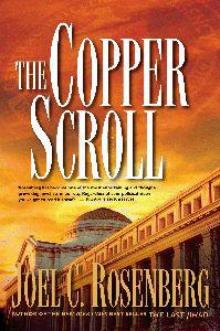 The Copper Scroll
The Copper Scroll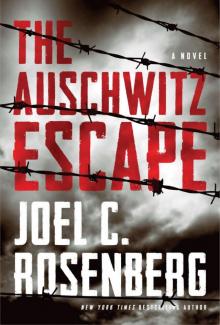 The Auschwitz Escape
The Auschwitz Escape The Last Jihad
The Last Jihad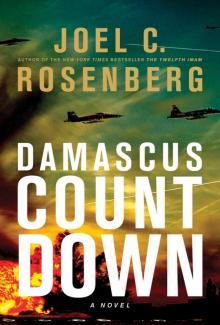 Damascus Countdown
Damascus Countdown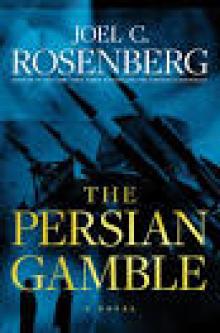 The Persian Gamble
The Persian Gamble The Jerusalem Assassin
The Jerusalem Assassin Dead Heat
Dead Heat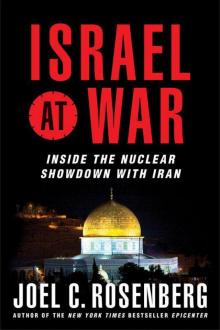 Israel at War: Inside the Nuclear Showdown With Iran
Israel at War: Inside the Nuclear Showdown With Iran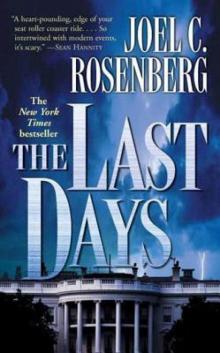 The Last Days
The Last Days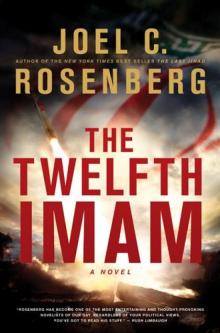 The Twelfth Imam
The Twelfth Imam Epicenter 2.0
Epicenter 2.0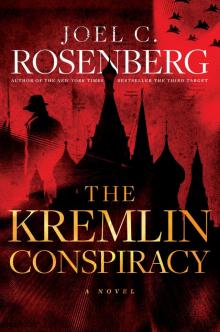 The Kremlin Conspiracy
The Kremlin Conspiracy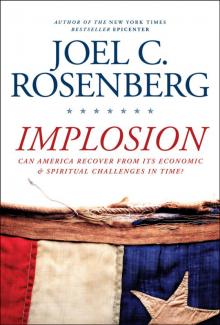 Implosion: Can America Recover From Its Economic and Spiritual Challenges in Time?
Implosion: Can America Recover From Its Economic and Spiritual Challenges in Time?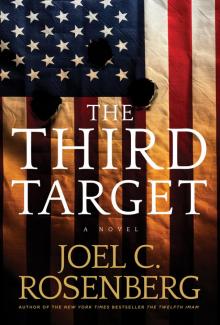 The Third Target: A J. B. Collins Novel
The Third Target: A J. B. Collins Novel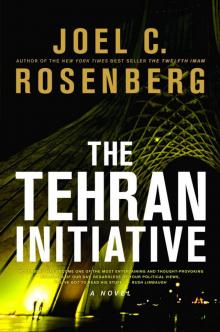 The Tehran Initiative
The Tehran Initiative Inside the Revolution
Inside the Revolution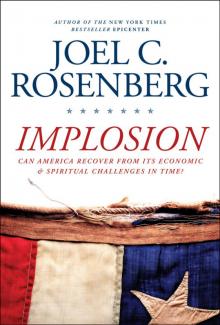 Implosion
Implosion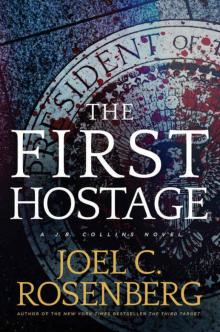 The First Hostage: A J. B. Collins Novel
The First Hostage: A J. B. Collins Novel